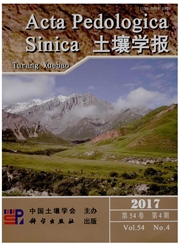

 中文摘要:
中文摘要:
设施蔬菜种植易引起土壤酸化和次生盐渍化及土传疾病的发生,严重影响蔬菜生产的可持续发展,亟需发展快速有效改良退化土壤的方法和技术。通过盆栽试验,比较研究了稻草、黑麦草和鸡粪用量分别为1%、3%和7%时,淹水15 d改良退化设施蔬菜地土壤的效果。结果表明,与不淹水不加有机物料处理(CKd)和淹水不加有机物料处理(CKf)相比,淹水添加有机物料加速土壤Eh的下降,能有效消除土壤积累的硝态氮,降低硫酸根含量,显著提高土壤pH,其变化幅度随有机物料添加量的增加而增大。退化设施蔬菜地土壤改良后,除稻草和鸡粪添加量为7%处理外,各有机物料处理黄瓜长势和产量均高于CKd和CKf处理。有机物料对退化土壤的改良效果表现为黑麦草〉稻草〉鸡粪,而有机物料添加量增大,并不显著改善黄瓜长势和提高产量。
 英文摘要:
英文摘要:
Consecutive vegetable cultivation in greenhouse easily induces soil acidification or salinization and serious soil-borne diseases, which considerably affects sustainable development of the vegetable production. It is of great urgency to develop some effective techniques and methods to improve degraded vegetable soils. A pot experiment was conducted for comparative study on effects of the application of rice straw (RS), ryegrass (RG) and chicken manure (CM) at different rates (1%, 3% and 7%, of the soil in pot) coupled with or without flooding for 15 days on degraded vegetable soil. Compared to CKd (no manure and no flooding) and CKf (flooding only), the practices accelerated decline of soil Eh effectively eliminate accumulated NO3-, lowered the content of SO42? and increased soil pH. The effect became more significant with the increasing application rate of organic manure. In the ameliorated soils, except for soils applied with 7% of RS or CM, cucumber was better in growth and yield than in CKd and CKf. In terms of soil ameliorating effect, the organic manures show a decreasing order of RG 〉 RS 〉 CM. However, more organic manure does not necessarily improve cucumber in growth or yield.
 同期刊论文项目
同期刊论文项目
 同项目期刊论文
同项目期刊论文
 Heterotrophic nitrification is the predominant NO3- production mechanism in coniferous but not broad
Heterotrophic nitrification is the predominant NO3- production mechanism in coniferous but not broad Effects of organic material amendment and water content on NO, N2O, and N2 emissions in a nitrate-ri
Effects of organic material amendment and water content on NO, N2O, and N2 emissions in a nitrate-ri Long-term field fertilization affects soil nitrogen transformations in a rice-wheat-rotation croppin
Long-term field fertilization affects soil nitrogen transformations in a rice-wheat-rotation croppin Response of soil microbial diversity to land-use conversion of natural forests to plantations in a s
Response of soil microbial diversity to land-use conversion of natural forests to plantations in a s Response of spatial variability of soil organic carbon in upland to expansion of extent in Northeast
Response of spatial variability of soil organic carbon in upland to expansion of extent in Northeast The contribution of nitrogen transformation processes to total N2O emissions from soils used for int
The contribution of nitrogen transformation processes to total N2O emissions from soils used for int Effects of long-term repeated mineral and organic fertilizer applications on soil nitrogen transform
Effects of long-term repeated mineral and organic fertilizer applications on soil nitrogen transform 期刊信息
期刊信息
